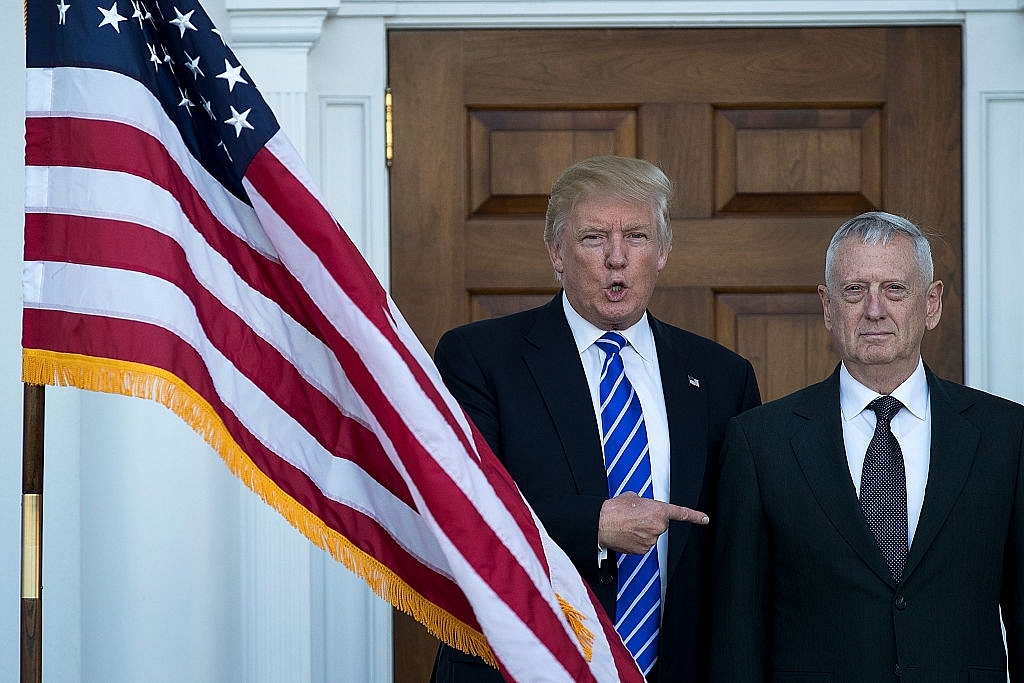World
Here’s What Donald Trump’s Top National Security Picks Have To Say About Radical Islam

Trump welcomes retired United States Marine Corps general James Mattis as they pose for a photo before their meeting at Trump International Golf Club, November 19, 2016 in Bedminster Township, New Jersey. (Photo by Drew Angerer/Getty Images)
Donald Trump is busy filling up the Cabinet posts. The world is largely indifferent to who he appoints as the secretary of education, transportation or agriculture. However, the people who will have a say in deciding the future course of America’s foreign policy matter. As far as national security and foreign policy are concerned, there are three posts that matter the most, those of National Security Adviser, CIA director, Secretary of State and Secretary of Defense. The position of US envoy to the UN is important, but not so much.
So far, Trump has announced his intention to appoint Michael T Flynn as his National Security Adviser, Mike Pompeo as the director of the CIA, retired General James “Mad Dog” Mattis as Secretary of Defense, Governor Nikki Haley of South Carolina as US ambassador to the United Nations. Trump has tapped 2012 Republican presidential candidate Mitt Romney for Secretary of State position among others but there is no confirmation as of today (2 December).
Among the people entrusted by Trump to look after national security of the US, there is one commonality: their views on Islam.
1) Michael Flynn, Trump’s National Security Adviser
From 2004 to 2007, Flynn served in the Afghanistan and Iraq wars as director of intelligence for the Joint Special Operations Command. From 2009 to 2010, he held the same role for the International Security Assistance Force in Afghanistan. Flynn is a registered democrat and was tapped by President Barack Obama to head Defense Intelligence Agency. He resigned in April 2014 over differences with anti-terrorism policies of the Obama Administration.
Flynn is referred as an anti-Islamist ex-general in the US mainstream media. He has been outrageously frank in airing his views on terrorism and the ideology of political Islam. Flynn views Islam as a political ideology hiding behind a religion. “We are at war with a radical component of Islam and the way I believe it is that Islam is a political ideology based on a religion,” Flynn had said.
He once tweeted that “fear of Islam is RATIONAL”.
Here’s what he said on Islamism in August this year.
2) General Mattis, incoming Secretary of Defense
Mattis believes that political Islam is not in America’s best interest. He has said that responding to political Islam is “the major security issue facing the United States.”
Here’s what he had to say in a speech given at the Heritage Foundation last year:
3) Jeff Sessions, incoming Attorney General
Though Senator Jeff Sessions will not be calling the shots when it comes to charting Trump’s foreign policy, as a top law enforcement officer, his views matter a lot. Sessions has called for a bipartisan strategy, akin to Cold War’s policy of "containment", to fight radical Islam. Sessions is ultra conservative senator from Alabama and was one of the earliest supporters of Trump’s call for a temporary ban on immigration from Muslim countries that are ravaged by war, like Syria and Iraq.
He had this to say on the matter:
Defending Trump, Sessions had said:
Being the chief law enforcement officer of the US, Sessions will now be in position to help Trump put at least some watered down version of that ban, given that the complete ban may be ruled unconstitutional.
4) Mike Pompeo, Next CIA Director
The incoming CIA director is not soft on radical Islam either. Pompeo believes that Muslim leaders across the US who fail to condemn terror attacks motivated by radical Islamic beliefs are "potentially complicit in these acts, and more importantly still, in those that may well follow."
After the 2013 Boston Marathan bombing, he had this to say:
On the mosques in America, Pompeo had this to say:
5) Nikki Haley, Next US envoy to the UN
Born to India immigrant parents, Haley has been the South Carolina governor since 2010. She was a vocal opponent of Donald Trump throughout the campaign. During the primaries, she endorsed Trump’s rivals, first Marco Rubio and then Ted Cruz when Rubio got out of the race. Haley had lambasted Trump when he had suggested a temporary Muslim ban into the US. She said at the time:
After Khizr and Ghazala Khan, the grieving parents of a fallen US Muslim soldier, denounced Trump for his proposed ban on Muslim immigrants, they were vehemently criticised by Trump and his supporters.
Haley took Trump to task then and said:
Introducing ElectionsHQ + 50 Ground Reports Project
The 2024 elections might seem easy to guess, but there are some important questions that shouldn't be missed.
Do freebies still sway voters? Do people prioritise infrastructure when voting? How will Punjab vote?
The answers to these questions provide great insights into where we, as a country, are headed in the years to come.
Swarajya is starting a project with an aim to do 50 solid ground stories and a smart commentary service on WhatsApp, a one-of-a-kind. We'd love your support during this election season.
Click below to contribute.
Latest